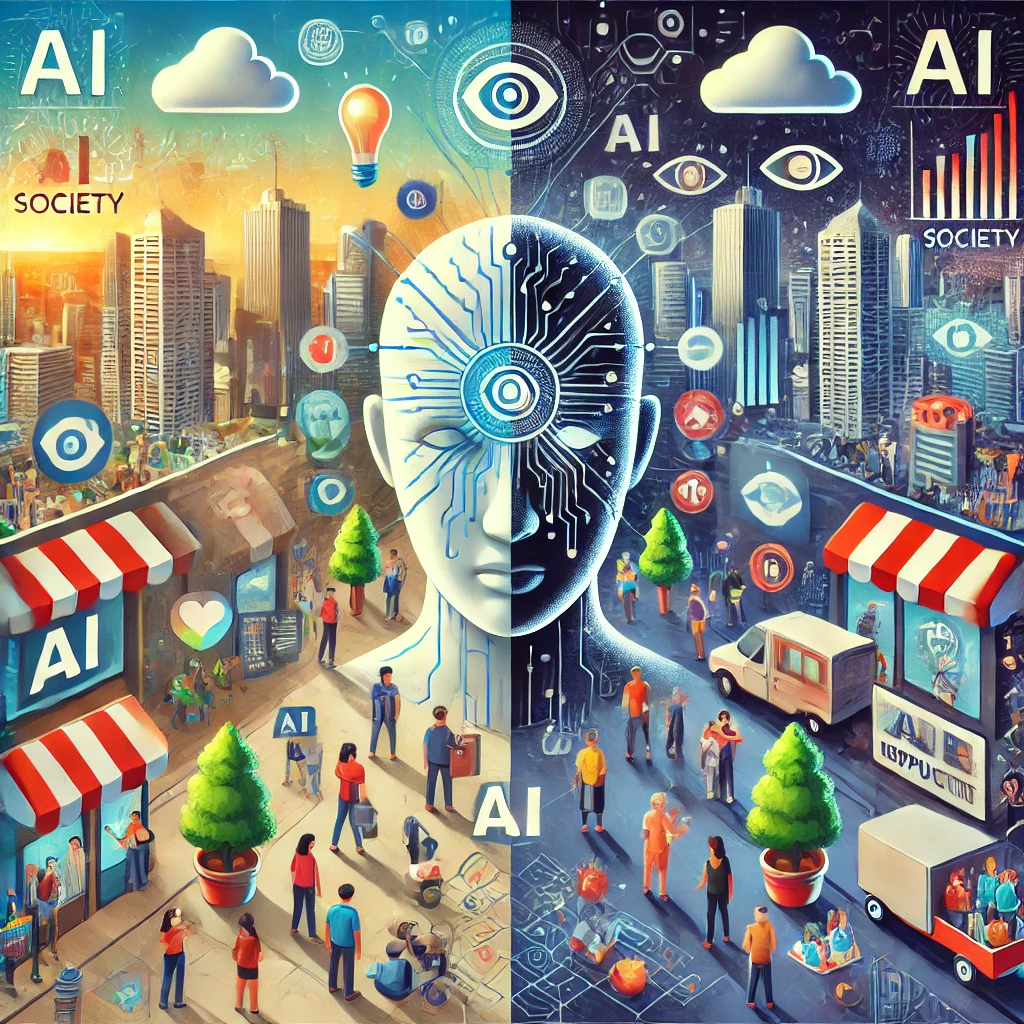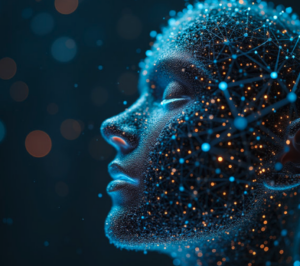
As AI continues to evolve, its impact on humanity remains profound. Explore how AI shapes the future, its benefits, and the challenges we must navigate to ensure it benefits society.
Artificial Intelligence (AI) is no longer a concept relegated to science fiction; it is an integral part of our daily lives, influencing industries, economies, and evenonal interactions. From virtual assistants like Siri and Alexa to complex data-driven algorithms that power autonomous vehicles, AI technologies are increasingly woven into the fabric of society. But as AI continues to develop and permeate various sectors, the future remains uncertain.
While AI brings the promise of significant progress in healthcare, education, transportation, and more, it also raises complex questions about ethics, privacy, job displacement, and the potential consequences of autonomous decision-making. The development of AI presents opportunities for global transformation, but it must be approached with careful consideration to ensure that it enhances human well-being and upholds values like fairness, transparency, and accountability.
This article will explore the many ways AI is impacting humanity, discuss the challenges it presents, and highlight the importance of navigating its development with a sense of responsibility. Understanding AI’s potential and pitfalls is crucial as we look ahead to the future.
The Promise of AI: Transforming Humanity for the Better
AI technologies have the potential to drive transformative changes that can improve lives in ways that were once unimaginable. Below, we delve into some of the most promising areas where AI is already making a significant impact.
1. Healthcare: Saving Lives with Precision
One of the most impactful applications of AI is in the healthcare industry, where it promises to revolutionize everything from diagnostics to patient care and drug discovery. Some key ways AI is transforming healthcare include:
- Medical Diagnostics: AI systems can process medical images such as X-rays, MRIs, and CT scans with remarkable precision, often detecting early signs of diseases suchas cancer or heart disease that human doctors might miss. Algorithms trained on vast datasets can identify patterns and anomalies that indicate medical conditions, allowing for earlier intervention and better outcomes.
- Predictive Analytics: AI can analyze patient data to predict outcomes, identify risks, and recommend personalized treatment options. By analyzing vast amounts of health data, AI models can provide more accurate forecasts about diseases, helping doctors prevent conditions before they become life-threatening.
- Drug Discovery and Development: AI speeds up the process of drug discovery by simulating how compounds interact with biological systems. For instance, AI can analyze genetic and molecular data to identify potential drug candidates, reducing the need for lengthy and costly trial-and-error testing. AI-driven platforms like DeepMind have already shown success in protein folding, which plays a critical role in drug discovery.
- Personalized Medicine: AI has the ability to tailor treatments based on individual genetic profiles, making treatments more effective and minimizing side effects. Personalized medicine is a game-changer, particularly for cancer patients who can benefit from therapies designed specifically for their genetic mutations.
2. Transportation: Making Travel Safer and More Efficient
AI is rapidly transforming the transportation sector, offering solutions that make travel safer, more efficient, and more accessible. Key innovations include:
- Autonomous Vehicles: AI is the backbone of self-driving cars, trucks, and drones. Autonomous vehicles use machine learning, sensors, and real-time data analysis to navigate roads, detect obstacles, and make decisions that reduce human error, which is responsible for most traffic accidents. For example, Waymo, the self-driving car division of Alphabet, has already demonstrated the viability of autonomous vehicles in urban environments.
- Efficiency and Sustainability: AI-driven transportation systems optimize route planning and traffic flow, reducing congestion and fuel consumption. Ride-sharing apps like Uber and Lyft use AI algorithms to match drivers with passengers in real time, reducing wait times and improving the efficiency of transportation networks. AI can also be used to optimize logistics in shipping and freight transportation, lowering costs and environmental impact.
- Mobility for All: AI in transportation can provide access to mobility for groups that traditionally face challenges, such as the elderly and people with disabilities. Autonomous vehicles can enable individuals who are unable to drive due to age or disability to travel independently, greatly improving their quality of life.
3. Education: Personalized Learning and Improved Access
AI’s role in education is increasingly being recognized, particularly as it has the potential to provide personalized learning experiences for students. AI-powered tools can help tailor educational content to each student’s needs, ensuring better learning outcomes. Some key applications of AI in education include:
- Intelligent Tutoring Systems: AI can provide real-time feedback to students, helping them understand concepts they may struggle with. Platforms like Khan Academy use AI to personalize learning by adjusting the difficulty of exercises based on the student’s progress. This ensures that learners are constantly challenged but not overwhelmed.
- Smart Classrooms: AI-powered classroom technologies can optimize the learning environment, adjusting lighting, temperature, and even classroom layout to improve focus and concentration. AI-powered chatbots and virtual assistants can also handle routine administrative tasks, such as scheduling and answering frequently asked questions, freeing up teachers to focus on instruction.
- Global Access to Education: AI can make high-quality education accessible to students around the world, especially in remote areas. By leveraging AI, educational platforms can deliver personalized content and even real-time tutoring to students in underserved regions, overcoming barriers of geography and economic status.

4. Climate Change: Harnessing AI for Sustainability
AI has a crucial role to play in the fight against climate change. With the ability to analyze vast amounts of environmental data and identify patterns, AI is being used to optimize energy systems, reduce waste, and find innovative solutions to environmental challenges.
- Energy Optimization: AI can be used to optimize energy grids, balancing supply and demand to reduce waste. Smart grids powered by AI can automatically adjust energy usage in real time, reducing the reliance on fossil fuels and improving the efficiency of renewable energy sources like solar and wind.
- Climate Modeling and Forecasting: AI can process complex climate data to improve predictive models and simulations. For instance, AI systems can predict extreme weather events like hurricanes, floods, or heatwaves, providing early warnings and giving communities more time to prepare.
- Sustainable Agriculture: AI can improve farming practices by optimizing irrigation, crop management, and pest control. Precision agriculture, powered by AI, uses data from sensors and satellites to monitor soil conditions, weather patterns, and crop health, leading to more sustainable and efficient farming practices.
The Challenges of AI: Ethical Concerns and Risks
While AI offers tremendous benefits, it also introduces a range of ethical and societal challenges that must be addressed to ensure AI’s responsible development and deployment.
1. Bias and Discrimination
AI systems learn from data, and if the data is biased, AI systems can perpetuate or even exacerbate those biases. For instance, facial recognition technology has been shown to be less accurate for people with darker skin tones and for women. Similarly, biased hiring algorithms can unfairly disadvantage candidates based on race, gender, or other factors.
Solution: Developers must prioritize fairness and inclusivity in the design of AI systems by ensuring diverse data sources and employing techniques to detect and mitigate bias. Regular audits and bias detection tools should be implemented to identify and correct biased outcomes.
2. Privacy and Surveillance
The integration of AI into everyday life raises concerns about privacy, especially in the realm of surveillance. AI-powered facial recognition systems can track individuals without their consent, and large-scale data collection can infringe on personal privacy. Additionally, AI algorithms used for advertising and recommendation systems can exploit personal data in ways that users may not fully understand.
Solution: Governments and organizations must enforce stricter data privacy regulations and ensure that AI systems are designed with privacy protections in mind. Practices such as data anonymization and user consent protocols are critical to maintaining trust and protecting privacy.
3. Job Displacement and Economic Inequality
As AI automates routine tasks across industries, concerns about job loss and economic inequality have grown. AI is particularly likely to affect low-skilled jobs in sectors like manufacturing, transportation, and customer service, leaving many workers vulnerable to displacement.
Solution: Governments must implement reskilling programs to help workers transition to new roles in the AI-driven economy. Initiatives such as universal basic income (UBI) or other safety nets could help mitigate the social impacts of AI-driven automation.
4. Lack of Transparency
Many AI systems operate as “black boxes, meaning their decision-making processes are not easily understood by humans. This lack of transparency can erode trust, particularly in critical sectors like healthcare, finance, and law enforcement.
Solution: Explainable AI (XAI) seeks to make AI decision-making more transparent. By developing systems that can explain their reasoning, developers can improve accountability and ensure that AI systems are used responsibly.
5. Autonomy and Control
As AI systems become more autonomous, questions about control and accountability arise. For example, should an autonomous vehicle be allowed to make life-and-death decisions in accident scenarios? Should AI systems be allowed to make decisions without human intervention, especially in high-stakes domains like law enforcement and military applications?
Solution: The principle of human-in-the-loop (HITL) should be implemented in high-risk areas. AI should support human decision-making, not replace it entirely. Clear ethical guidelines and regulatory oversight are essential for managing AI’s autonomy.
AI’s rapid evolution presents both immense opportunities and profound challenges for humanity. From transforming healthcare and education to driving economic growth and combating climate change, AI has the potential to improve lives on a global scale. However, as we navigate this new era, we must approach AI development with a strong commitment to ethical principles such as fairness, transparency, and accountability.
Collaboration between governments, tech companies, ethicists, and society will be essential in creating frameworks that ensure AI benefits humanity without infringing upon rights, exacerbating inequalities, or introducing unintended risks. The future of AI is not predetermined—it is up to us to guide its development responsibly.
FAQ (Frequently Asked Questions)
1. What are the benefits of AI for humanity?
AI offers a wide range of benefits, including advancements in healthcare, transportation, education, and environmental sustainability. AI systems can improve diagnostics, optimize transportation networks, personalize learning experiences, and help combat climate change.
2. What ethical challenges does AI pose?
AI raises concerns such as bias and discrimination, privacy issues, job displacement, lack of transparency, and the autonomy of AI systems. Addressing these challenges requires ethical design, fairness, transparency, and strong regulatory oversight.
3. How can AI impact jobs and employment?
AI is likely to displace certain jobs, especially those involving routine, repetitive tasks. However, it can also create new roles in fields like AI development, robotics, and data science. Reskilling programs are essential to help workers adapt to the changing job market.
4. Can AI make decisions without human intervention?
While AI can make decisions autonomously in some contexts, it is essential to maintain human oversight, particularly in high-risk areas such as healthcare, law enforcement, and autonomous vehicles. Ethical frameworks should guide AI’s autonomy.
5. How can AI help in the fight against climate change?
AI can optimize energy use, predict extreme weather events, and improve agricultural practices. By enhancing energy efficiency and enabling smarter resource management, AI can play a significant role in reducing carbon footprints and mitigating climate change.
6. What role do governments play in regulating AI?
Governments are responsible for creating laws and regulations that ensure AI is developed ethically and responsibly. This includes creating policies on privacy, data protection, and bias, as well as promoting research on AI ethics and its societal impact.
7. Can AI systems be biased?
Yes, AI systems can reflect the biases present in the data they are trained on. This can lead to biased outcomes, especially in areas like hiring, law enforcement, and credit scoring. Ensuring fairness in AI systems requires diverse data, regular audits, and ongoing refinement.
8. How will AI affect privacy?
AI can pose risks to privacy through large-scale data collection and surveillance. To protect privacy, regulations such as GDPR (General Data Protection Regulation) need to be enforced, and AI systems must be designed with strong privacy safeguards.
9. What is Explainable AI (XAI)?
Explainable AI (XAI) refers to AI systems that are designed to provide human-understandable explanations for their decisions. This transparency helps build trust in AI systems and ensures accountability, particularly in sectors like healthcare, finance, and law enforcement.
10. What are the risks of AI in the military?
AI-powered systems in military applications raise concerns about autonomous weaponry, decision-making without human oversight, and the potential for escalation in conflicts. Ethical guidelines and international regulations are needed to ensure AI is used responsibly in military contexts.


